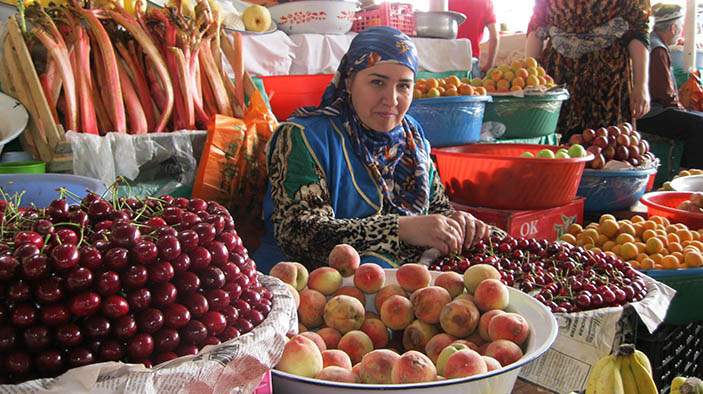Central Asia—Competitiveness, Trade, and Jobs Activity (CTJ); Trade Central Asia (TCA)
Client: U.S. Agency for International Development
Duration: 2016-2026
Region: Eastern Europe and Central Asia
Country: Regional
Solutions: Economic Growth
A quarter of a century after the disintegration of the Soviet Union, the Central Asian Republics have yet to realize full regional integration or sustained economic growth outside of the oil and gas industries. In addition, state control over business freedoms and rivalries among national governments have led to restrictive trade policies and stifled private sector investment, resulting in a stagnant economy and limited job opportunities. Large segments of the population remain mired in poverty, resulting in migration to find work and vulnerability to recruitment by violent extremist groups.
The U.S. Government’s New Silk Road Initiative is supporting Central Asia to regain its place at the center of renewed trade between the East and West. An integral part of the initiative is the Trade Central Asia (TCA) activity, funded by the U.S. Agency for International Development (USAID), and working in Kazakhstan, Kyrgyzstan, Tajikistan, Turkmenistan, and Uzbekistan to improve the region’s trade environment, resulting in growth for exports and increased employment.
DAI’s strategy focuses on facilitating the development of competitive, inclusive market systems in the region while ensuring that activities are demand-driven and locally led to increase sustainability. TCA promotes growth in the agricultural, transport, and logistics sectors by leveraging other USAID investments in the region, including two DAI-managed activities: Uzbekistan Agricultural Value Chains and Pakistan Regional Economic Integration Activity.
By 2026, we anticipate that the activity will have reduced the average time to move goods by road from Afghanistan to Kazakhstan by more than 25 percent, and that more accessible sources of information, better networking opportunities, and strengthened trade promotion service providers will generate more than $100 million in new cross-border sales.

Sample Activities
- Collaborate with public- and private-sector partners to develop a plan to address regional trade facilitation opportunities and support businesses in complying with regulations and requirements.
- Work with community influencers to draft local engagement plans to support initiatives related to building facilitation skills, job readiness, and entrepreneurship.
- Establish an innovation facility to motivate firms to design and implement solutions to overcome specific market failures related to horticulture, transportation, and border management.
Select Results
- TCA helped Turkmenistan digitalize business processes by applying the Electronic Consignment Note information technology solution.
- TCA supported the Government of Uzbekistan in undertaking a phytosanitary capacity evaluation process, which will be a basis of recommendations for reforms.
- TCA facilitated the opening of Women in Logistics and Transport Association offices in Kazakhstan, the Kyrgyz Republic, Tajikistan, Turkmenistan, and Uzbekistan.
- TCA co-organized the seventh International Universal Exhibition Fair. The expo drew 1,200 visitors and resulted in the signing of 10 Letters of Intent for deals valued at $9 million. An adjoining business forum facilitated investment agreements worth $920 million.
- CTJ organized the Central Asia Trade Forum, an annual event that promotes regional connectivity within Kazakhstan, Kyrgyzstan, Tajikistan, Turkmenistan, and Uzbekistan. The 2019 forum brought together more than 800 government and business leaders from countries across Asia, Europe, and the United States in Shymkent, Kazakstan to discuss and share ideas on horticultural innovation and trade investment.
- CTJ supported seven companies from Kazakhstan, Kyrgyzstan, Tajikistan, Turkmenistan, and Uzbekistan to attended the Anuga trade fair in Germany, the largest food and beverage trade fair in the world. The Central Asian companies exhibited their horticultural products together under the “Taste of Central Asia” stand.
- CTJ conducted a Regional Trade and Transport Forum in Termez, Uzbekistan—co-hosted with the Uzbekistan Ministry of Transport and the Termez City Government and jointly funded with the U.S. Department of Commerce Commercial Law Development Program—where delegates agreed to cooperate by signing over $600,000 worth of business deals among counterparts from Central Asia, Afghanistan, India, Pakistan, and beyond.
- CTJ invested $1.97 million in 34 innovation projects co-financed through an Innovation Fund, established to incentivize partners to undertake innovative initiatives in the horticultural, tourism, and transportation and logistics sectors to increase their exports, grow their businesses, and create new jobs. The Innovation Fund leveraged $5.89 million in private sector investment, which resulted in 23 companies creating 634 new jobs and 13 firms exporting products to 37 new markets.
Featured Links
RELATED CONTENT:
Burma—Responsible Investment and Trade Activity
The Burma Responsible Investment and Trade Activity, funded by the U.S. Agency for International Development (USAID), works with a broad range of international and domestic private sector firms and civil society actors to promote civilian ownership of the Myanmar economy by increasing the share held by responsible, accountable, and transparent firms.
Read More